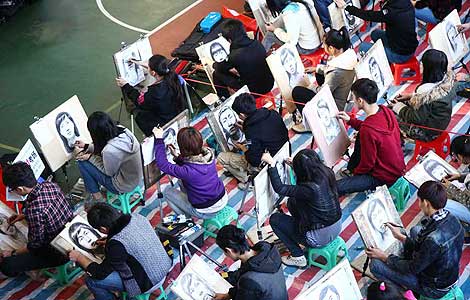US Treasury chief says high-level engagement 'welcomed'
Updated: 2014-01-17 09:08
By AMY HE in New York (China Daily USA)
|
||||||||
US Secretary of Treasury Jack Lew said that he believes high-level US engagement on China's economic policy and reform is welcomed.
Transition in an economy such as China's, where leaders are starting to implement economic reforms posted in outcome of the Third Plenum, is difficult, Lew said on Thursday in a discussion with Wall Street Journal Assistant Managing Editor John Bussey at the Council of Foreign Affairs.
"I can't tell you that at the end of this year we'll be able to say they made the move we hoped they would make. I can tell you that we're going to engage with them at high levels on a consistent basis to keep pressing forward, making the case, and I believe that's welcomed," he added.
Lew said what concerns him is when reforms will start taking place. "When I meet with my Chinese counterparts, I am pretty confident that they are intent on the path of economic reform that they describe," he said. "At the same time, I am not confident about the timeframe or which targets of opportunity will be sequenced early in the queue."
Top leaders in the Chinese government stressed market reform in discussions at the Third Plenum at the end of last year, and Lew said he thinks the Chinese "are going to move in that direction."
At the same time, Lew said that if there are artificial barriers in place, market forces won't work. During last summer's strategic and economic dialogues, the two countries agreed on important policies, and Lew said that he was "very pleased" that China opened the Shanghai Free Trade Zone. "They've moved on altering a decade's long policy of presuming industries were closed to foreign activity to presuming that they're open, unless individually closed," he said.
In spite of that, there are still restrictions being imposed in the zone, including designations of "what's open and what's close," he said referring to the free trade zone's negative list, which has bans certain investments.
If the zone can open up to "real competition" - competition from US financial firms, for example - then that will be "a meaningful signal," he said.
At a 2014 economic forecast at the beginning of the year, Peking University economist Yao Yang cautioned that reform plans will face challenges, noting that the negative list in the Free Trade Zone has disappointed investors since almost all kinds of bans are specified.
As for China's State-owned enterprises (SOEs), Lew stressed again that "it's critical to the Chinese economy to let market forces drive much more - if not all - major economic policy." SOEs see built-up inventory and empty buildings and that's "not a way to maintain growth" in the coming years, he said.
When the Treasury secretary visited China, Lew's Chinese counterparts didn't tell US leaders to "stay out of their business," he said, but wanted to learn from the US' economic experience.
"I think our continuing to bring focus to these issues is something that helps them to make progress. But I approach it in a very clear-headed way. Intentions are critical and they're important, but it's results in the end that matter," Lew said.
amyhe@chinadailyusa.com

 'American Hustle,' 'Gravity' lead Oscar nominations
'American Hustle,' 'Gravity' lead Oscar nominations
 Wildfire out of control in Los Angeles, US
Wildfire out of control in Los Angeles, US
 Way to art school
Way to art school
 'American Hustle,' 'Gravity' lead Oscar nominations
'American Hustle,' 'Gravity' lead Oscar nominations
 138th Westminster Kennel Club Dog Show to open
138th Westminster Kennel Club Dog Show to open
 Volcano displaces thousands in Indonesia
Volcano displaces thousands in Indonesia
 China issues fog alerts
China issues fog alerts
 Stray cats on the way to be slaughtered saved
Stray cats on the way to be slaughtered saved
Most Viewed
Editor's Picks

|

|

|

|

|

|
Today's Top News
US Treasury chief says high-level engagement 'welcomed'
Dirty air? Why not wash it?
He Xiaohui: A visionary rooted inservice
Auto-glass maker invests $200 million for US plant
Consul General lauds progress in 2013
Teaching English in China a good Plan B
China's US debt holdings reach record high
Asiana firefighters saw victim alive
US Weekly

|

|






